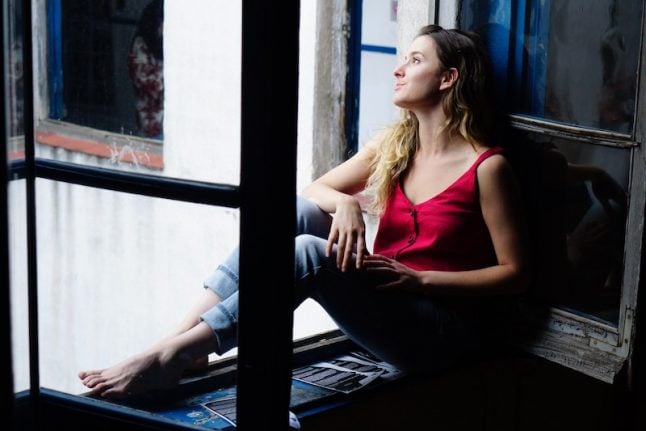What was your life like just before the lockdown vs. today?
I was busy getting ready for upcoming dance performances, rehearsing every day, and going to castings. I was really nervous about nailing the iconic Dirty Dancing lift, which I was going to perform for a 3,000-person audience at an event in April. I was also training with the theater group Mad Improv and had just landed an (amateur) acting gig.
Now, I’m home. All of my art-related jobs have been canceled and the dance studios I train at are of course closed. I’m trying to keep in shape at home and stretch outside on my little balcony when the sun’s out. I’m also extremely grateful to be able to work remotely, and I’ve been pouring my creative energy into VeraContent and Naked Madrid.
How are you coping?
Sharing people’s stories has helped me stay grounded. When the lockdown first hit here (a full month ago!?), it was such a strange and unsettling time for all of us, and it was really difficult to describe how it felt to people outside Madrid. So I decided to launch a series called the “Lockdown Diaries” on Naked Madrid. I just asked a few of my contacts to fill out a simple Q&A. As soon as I published the first diary by Cat Powell on March 16th, new submissions came flooding in, and the series took off!
Shortly after “Lockdown Diaries” launched, writer Daniel Catalan came on board and started helping me capture compelling stories from people of all walks of life, from local artists to small business owners. Dan even reached out to a doctor treating COVID patients and interviewed a guy named Travis who was quarantined with his ex!
With all the ups and downs we’ve experienced this past month (Dan has been stranded alone in the Basque Country this whole time), working on this ongoing series has helped keep us sane. It gives us a sense of purpose, keeps us connected to people, and reminds us that we’re not alone in this.
I’m also coping by binge-watching Netflix series (I highly recommend Sex Education, Pose, and the mini-series Unorthodox), making large pots of ginger tea, dancing every day, and sharing a bottle of wine or La Virgen beer with my partner every night.

How has the lockdown impacted your industry?
The dance world has completely shut down, and it’s devastating. Most artists are in a tragic situation right now… That being said, it’s pretty incredible how dancers around the world are coming together to help each other through this, by live-streaming classes and performances for free. I hope we take this sense of comradery with us after this is all over.
On the other hand, the content and marketing industry – where my company comes into play – is doing just fine. Our team works remotely year round and collaborates with freelancers all over the world, so it was just a matter of sending a WhatsApp message to let everyone know to stop coming to the office.
Have you noticed any acts of kindness or uplifting things recently?
Of course, tons. What journalist Leah Pattem is doing on her website Madrid No Frills is extraordinary. She’s advocating for people like migrants and the homeless who are in dire situations and receiving almost no help. Please check out her channels and support her if you can.
And so many people are trying to find ways to support small businesses by buying gift certificates, ordering online, and giving them shout-outs on the internet. This hits close to home for me because my family owns a coffee shop in New York City which, of course, is currently closed. Small businesses have been severely impacted and those love letters on social media and kind gestures do help.
Who are you in quarantine with? Any advice for people in your similar situation?
I’m in quarantine with my two cats and my partner. My advice is to give each other a lot of space. And my best tip: take your phones off the table (and out of sight) when you’re having dinner or sharing a bottle of wine. Also, cats are the best quarantine companions. Now I know what their life is like year round!
Have there been any comical moments in this unprecedented time?
Watching my cats do ninja tricks around the house is pretty hilarious. And getting my whole family on Zoom has been quite entertaining, from the screen freezing constantly to everybody talking at the same time…
What goals are you hoping to achieve as our time in lockdown continues?
Life is funny sometimes. Just a month ago I was getting ready to dance on stage but right now I want to focus on my company and continue compiling stories and insights from people I respect. I’m even launching a new series on another online publication I manage, The Content Mix, which will focus on the takeaways that businesses can carry with them after the crisis has passed. We’ve all had to overcome major obstacles lately, and I think we should make the most of the lessons learned moving forward.
What’s the first thing you’ll do once this lockdown is over?
I’ll go straight to my dance studio, Escuela Mayor de Danza. Then I’ll get a plane ticket and go visit my family in NYC and have a coffee at my family’s cafe, The Hungarian Pastry Shop.
Do you have any tips for how you can help those in need?
If you can help others in any way, that’s wonderful. But my sister told me something recently that I totally agree with: “Just take care of yourself right now and be a voice of reason.” Staying safe and sound during this time is enough. You don’t have to be a hero. You can help later on if you’re not in a position to at the moment.
What’s going on in your hometown and would you like to send them a message?
Stay home, New York.
Daphne Binioris is a native New Yorker who has been living in Madrid for over a decade. She’s the co-founder of multilingual content agency VeraContent and editor of online publications Naked Madrid and The Content Mix. She’s also a professional dancer.
Follow her on LinkedIn and Instagram. Find Naked Madrid on Facebook, IG and LinkedIn and check out all Madrid lockdown diaries
READ MORE:
- OPINION: How my fiesta-loving neighbours became my world in Spain's coronavirus lockdown
- Spain lockdown: Top ten tips to survive (and thrive) during quarantine
- Coronavirus in Spain: The abuela guide to staying sane during lockdown



 Please whitelist us to continue reading.
Please whitelist us to continue reading.
Member comments